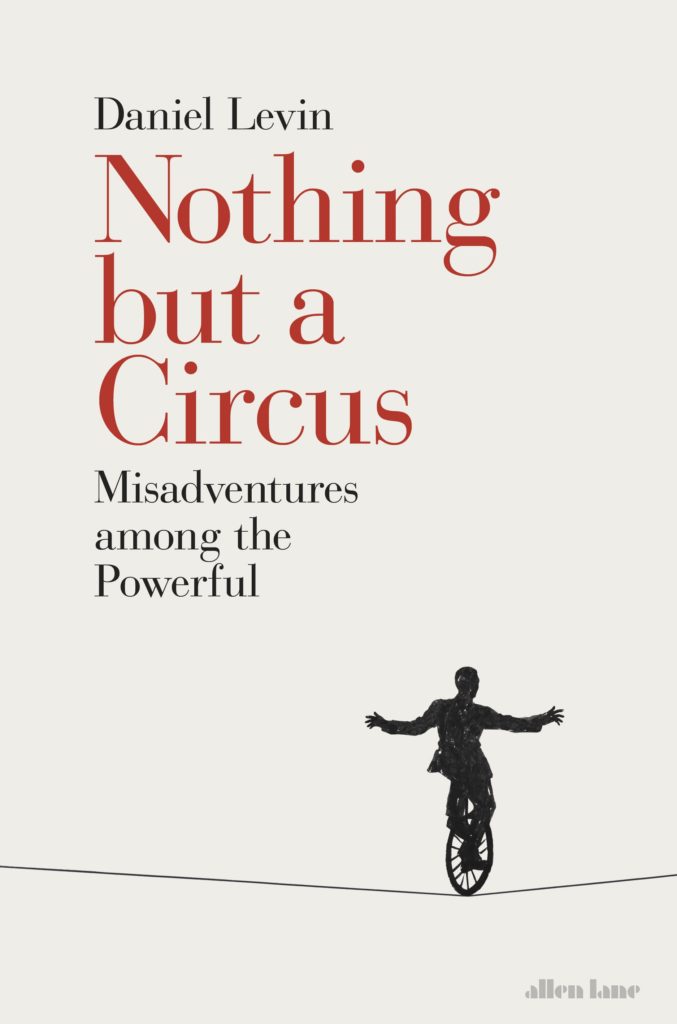Autor do Nothing but a circus
 No meio da Lava Jato e dos escândalos desse Brasil que insiste em se atirar balas nos próprios pés,
No meio da Lava Jato e dos escândalos desse Brasil que insiste em se atirar balas nos próprios pés,
tive o prazer de ler Nothing but a Circus, o primeiro livro do americano Daniel Levin. E ao terminar a leitura (devorei as 220 páginas em 2 dias), sai com a impressão que a profissão mais velha do mundo se chama Corrupção. O relato pessoal, construído como um livro de memorias, abre os olhos enquanto a falência moral das pessoas que costumamos olhar como salvadores da pátria ou simplesmente lideres imbuídos de conduzir nossas sociedades.
Faz bem ler o diário do Daniel Levin porque nos tira da telenovela judiciária que tomou conta desse pais desde 2014, nos tira do noticiário repleto de prisões, delações e inquéritos, nos faz pensar sobre o que importa: valores e capacidades. Apesar de nunca falar do Brasil, o livro do Daniel Levin parece uma dança de tango entre dois assuntos essenciais – e que desertaram Brasília pelo visto – Honestidade e Competência.
O Daniel Levin é um advogado americano especializado em projetos internacionais envolvendo grandes empresas e governos. Nasceu no Quênia e guardou desde a sua infância africana um grande carinho pelo continente negro. Assim que pôde, ofereceu seu conhecimento dos sistemas financeiros a quem quiser ajudar de verdade ao desenvolvimento da África. O seu livro conta dezenas de anedotas, todas engraçadas e impactantes, de reuniões homéricas com a ONU em Nova Iorque, projetos sem cabimento nenhum que ninguém quer cortar por arrogância e cegueira burocrática, presidentes e dignitários interessados por se manter no poder a toda custa. Daniel Levin não parou por aí, trouxe histórias que dão frio na barriga sobre a Rússia do Putin e o Congresso americano.
O autor teve a oportunidade de conhecer a nível pessoal líderes de primeira linha e ficou espantado pelo desconexo entre as suas habilidades extremas para chegar ao topo da pirâmide e sua absoluta vacuidade intelectual na hora de cuidar de economia e sociedade. O gênio capaz de eliminar concorrentes, de ocupar todo o espaço político por meio de intimidação e violência, se revela um incompetente crônico no que interessa: desenvolver o país que administra, reduzir pobreza e desigualdades.
Preparei-me a encontrar auto-valorização e auto-glorificação, vaidade e narcisismo. Pensava topar com traidores e especialistas em golpes baixos, egocêntricos e mentirosos. Pensava conhecer a incompetência e a inépcia. E me deparei com tudo isso. O que me surpreendeu de verdade foi perceber que as pessoas no poder e ao redor dele são tão prevísseis e incrivelmente ordinárias
Trecho da introdução do Nothing but a circus
O livro do Daniel Levin deveria ser na grade de qualquer faculdade de ciência política. É brutal pelo diagnóstico, causa inquietação em quem tiver um pingo de consciência cívica mas nunca deixa o tom engraçado, o estilo nítido e acessível. Um detalhe a mais: não há víeis ideológico nessa obra, nada de piscadas bobas para esquerda ou direita, nada de vitimização da África ou de agressividade desnecessária contra o Ocidente. Daniel Levin não precisa disso, ele tem o grande privilégio de saber do que fala.
Nothing but a circus: Misadventures Among the Porwerful (Ed Allen Lane) é disponível no Brasil na Livraria Cultura e na Amazon. Não há previsão ainda de tradução para o português. ManuMilitari traz para você, em exclusividade, a primeira entrevista do autor a um meio de comunicação brasileiro.
O autor respondeu as minhas perguntas em inglês.
E nos deu uma entrevista por vídeo que lhe oferecemos em breve com subtítulos em português.

ManuMilitari:
“I did expect to encounter self-importance and self-aggrandizement, vanity and narcissism. I did expect to meet backstabbers and tools, self-aggrandizers and fabricators. I did expect to face incompetence and ineptitude. I was not disappointed. What I did not expect, however, is for people in and around power to be so predictable, and so extraordinarily ordinary.”
This is powerful and straightforward! People often say that power is addictive, dirty and cynical. You seem to have witnessed events and attitudes that went beyond the imaginable, right?
Daniel Levin : That depends on how you define “the imaginable”. As I wrote in the section you cited from my book, I did expect bad behavior from people in an around power – greed, self-promotion and self-aggrandizement, manipulation, cruelty and the total absence of empathy, and of course an astronomical dosage of vanity and narcissism, which has now found an extraordinary manifestation in the United States. The association of these traits with power, just like the correlation with people seeking power, is hardly new, and I devoted each chapter of my book to one of these traits. So I cannot say that it went beyond the imaginable, as you phrased it. What I did, however, find surprising, sometimes even shocking, was how mediocre and ordinary most of these individuals were at everything other than amassing and consolidating their own power. Time and again I encountered this shocking schism: On the one hand, pure genius when it came to rising through the ranks, eliminating adversaries and competitors, and exhibiting ruthlessness and intimidation to stay in power. On the other hand, abject stupidity, disinterest, and ineptitude when it comes to leading and providing value to the general population and in particular to those in need. In other words: great at ruling, terrible at governing.
MM: Technology is improving day by day while leadership (especially the political one) seem to stall or even deteriorate. Isn’t this the curse of our times?
Levin: I don’t see the rise of technology and political leadership as mutually exclusive. Perhaps on an immediate level, particularly on social media, there has been a deterioration in the culture of political discourse, as evidenced by America’s tweeter-in-chief, which added not only a harsh and crude tone into daily exchanges, but also kept the dialogue at a more shallow, gimmicky playground level. At the same time, however, technology has allowed for far greater political inclusion and awareness. Information can now be disseminated cheaply and with lightning speed through the Internet and ubiquitous mobile phones, allowing for mass mobilization especially of young citizens. One of the first times we witnessed this was during the Arab Spring in 2011, and we can only wonder how other civil unrests and acts of political unrest would have unfolded if they had taken place in more recent times – imagine, for example the viral contagion potential of the Tiananmen Square protests if cell phones with videos and social media links had been available to those students in Beijing. Chinese history of the past two decades might have turned out very differently. Essentially, technology is a huge accelerator – for better or for worse, depending on the message being accelerated and the individuals doing the accelerating.
MM: What is the biggest problem affecting human development: Corruption or Incompetence?
Levin: I strongly believe that corruption breeds incompetence. Individuals who thrive in corrupt environments and who rise through corrupt means by definition are never in the positions they are because of merit. They possess neither the personal nor the professional qualifications to fulfill the tasks of their jobs, which means that they are incompetent. In that sense, and because of the causal relationship of corruption and incompetence, I view corruption as the greater evil, also because it so rapidly corrodes the public’s trust in its leaders (it takes a little longer to figure out how incompetent they are). But what really fascinates me, and what I tried to describe in my book, is the self-righteousness of corrupt “leaders”, especially at that delicious moment they so easily succumb to the temptations and justify their corrupt and self-serving choices for the sake of some imaginary and nonsensical greater public good.
MM: Isn’t cynicism, ineptitude and corruption a kind of civil war waged in most countries of the world?
Levin: I would not call it a “civil” war, because that connotes a particular kind of armed conflict between opposing parties in a country, and by overusing the term in another context we risk diluting it and ultimately depriving it of all meaning. But I do believe it is a “war” in the sense that it is an act of aggression, especially with respect to corruption and its pernicious effect on a country as a whole and in particular on its most vulnerable citizens. Ineptitude, as I mentioned earlier with respect to incompetence, is a consequence or a by-product of corruption, while cynicism is a state of mind – prevalent both with those in power towards the rest of the country and with the masses deprived of state services and effective, clean governance.
MM: Tell us about your platform for financial education.
Levin: The financial education platform was developed in response to many personal experiences with failed development efforts, in which national and international institutions seemed incapable of implementing their grandly announced development initiatives. I describe one particularly stark episode in the chapter “Luanda Lessons”, during which I realized that I myself was very much part of the problem, rather than the solution. It was an experience in the late 1990s that caused me to rethink our approach to development and led me to focus less of importing “solutions” based on boilerplate diagnostic studies, and instead to develop a knowledge and tools platform without any national bias for the benefit of a team of local professionals who would then be able to tailor their reforms to their own national realities – political, economic, social, and cultural realities. Once we identified this local team, we provided for intensive training in the platform’s modules, which in turn became the tools for the implementation of their reforms, including financial literacy TV and radio programs for the general population, capacity building and training programs for a broad cross-section of professionals, the creation or improvement of state institutions and courts, legislation, and many other platform elements. In addition to tailoring and implementing these modules with our staff’s help, the local team also took on the obligation of expanding its own base through pre-defined teach-the-teacher programs that were part of our platform.
MM: If the prominent people are so dysfunctional, what to expect among the masses, the poor and the overlooked?
Levin: It is a mistake to look only to political leadership – the group you call “prominent people” – for salvation. Our societies evolve, including through the rapid rise of technology and its accelerator effect we discussed earlier, and there are many other, new parties and forces effecting the lives of ordinary people. The less effective political leadership becomes, because of corruption or as a result of a partisan, antagonistic political climate that prevents effective services and solutions, the more new players in new spaces rise to the surface. We are also witnessing a new dimension to philanthropy and related fields such as impact investing, which are redrawing the social, financial, and political landscape. But, ultimately, getting one’s voice heard is about leverage and becoming a critical mass in order to effect positive change by peaceful means. This requires participation in the political process, rather than its disappointed abandonment. Revolutions, as Georg Büchner presciently wrote in Danton’s Death, do end up devouring their own children.


Leave a Comment